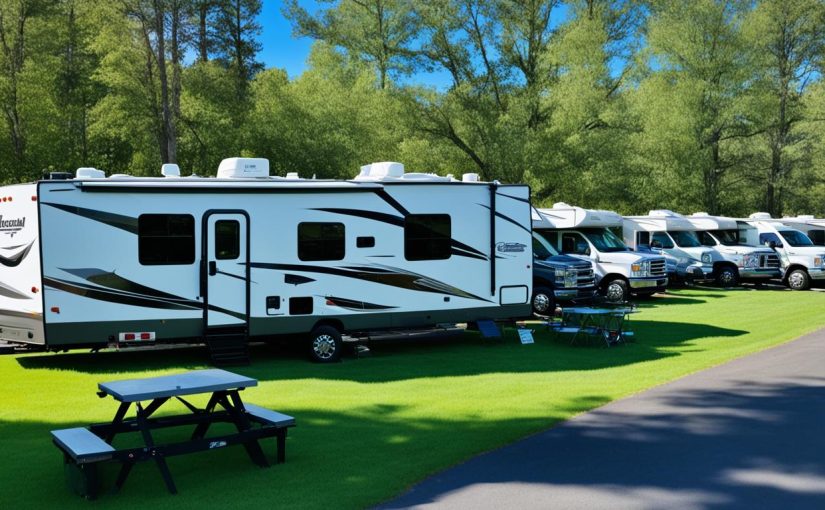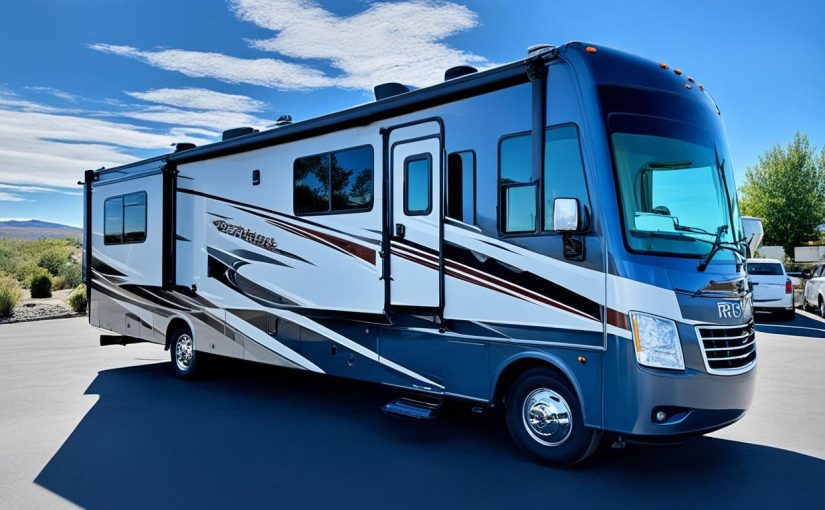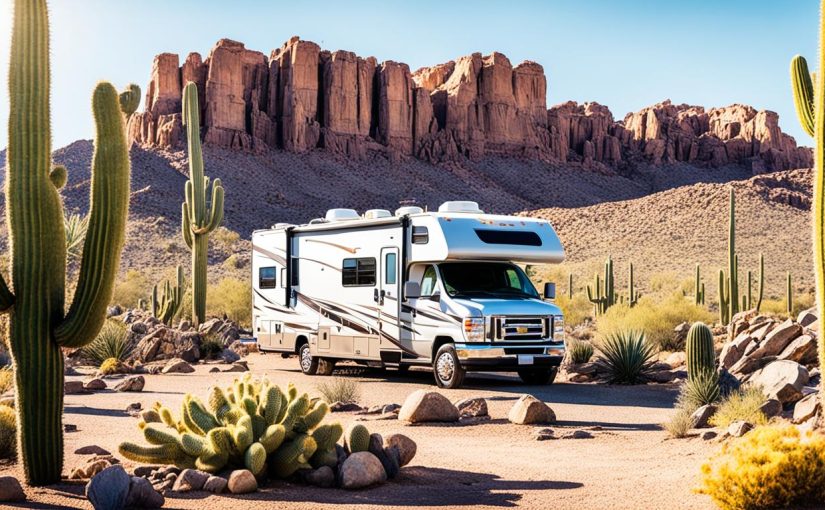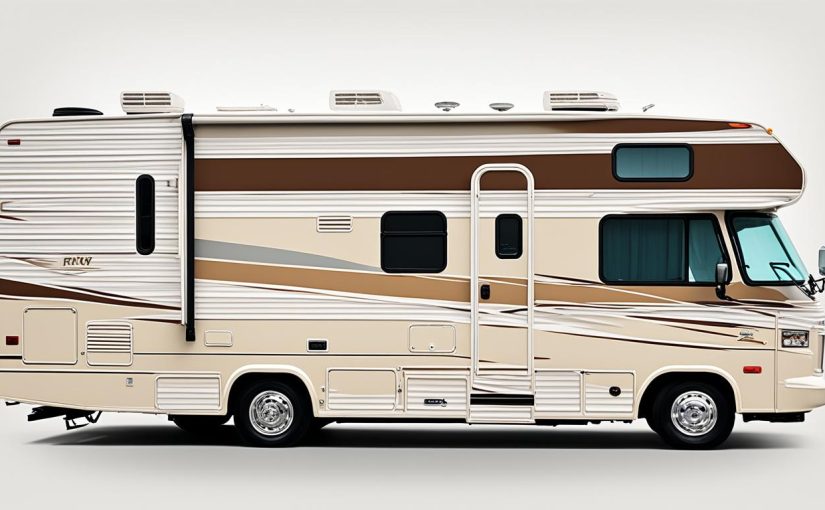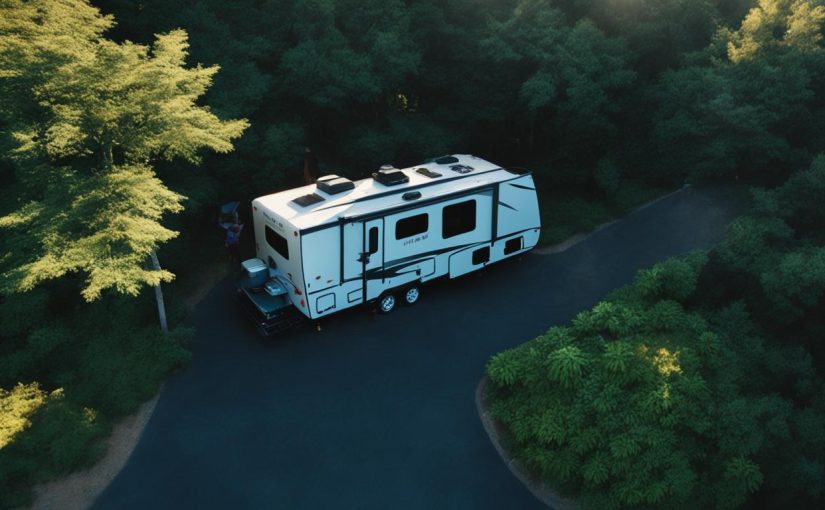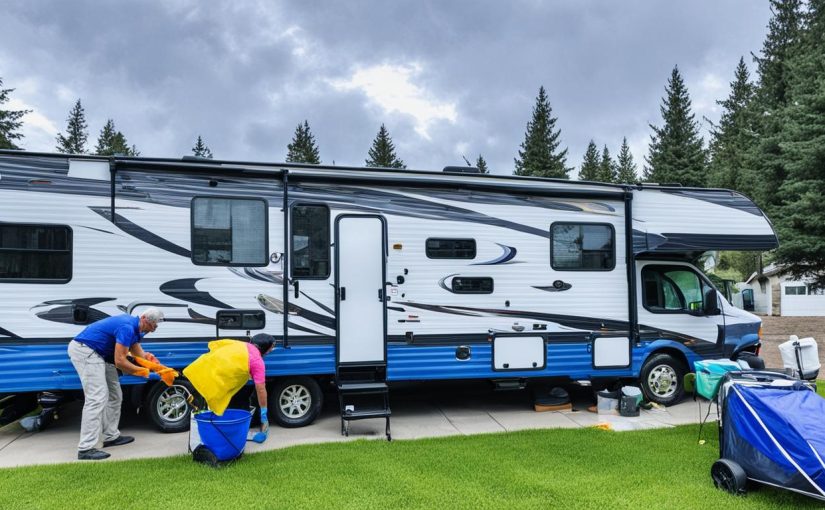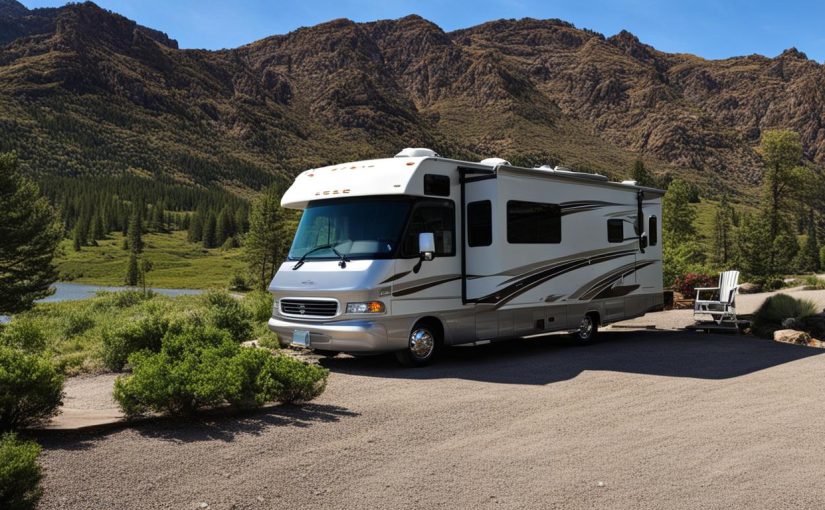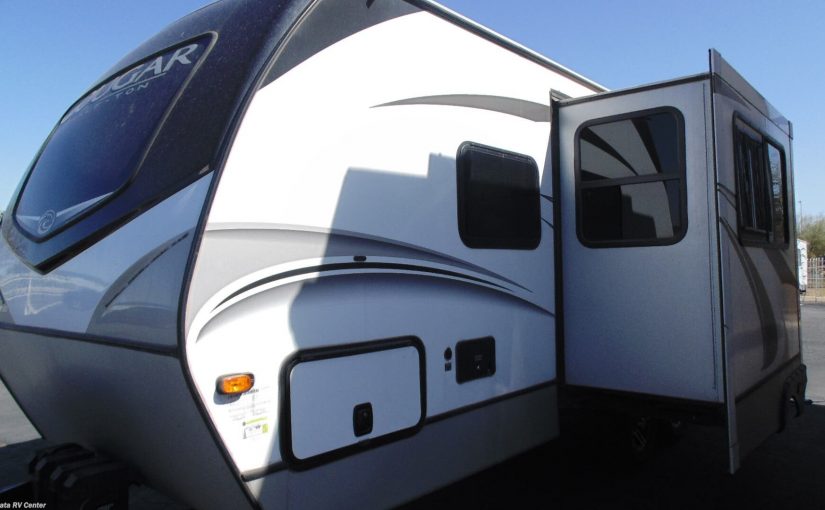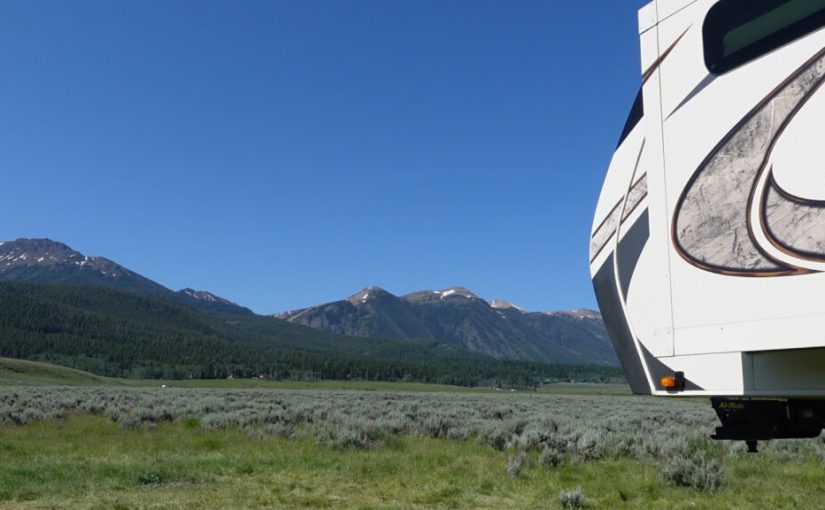Selling an RV can be an exciting venture, but it also requires careful consideration and preparation. Whether you’re looking to upgrade to a new model or simply part ways with your beloved motorhome, there are several factors to keep in mind to ensure a successful sale. By understanding the key aspects of selling an RV, you can navigate the process smoothly and maximize your chances of getting the best value for your vehicle.
In this article, we will provide you with valuable tips and insights on selling an RV, covering everything from preparing your RV for sale to legal and financial considerations. Whether you’re a seasoned RV owner or a first-time seller, this guide will equip you with the knowledge you need to make informed decisions throughout the selling process.
Key Takeaways:
- Prepare your RV for sale by cleaning, decluttering, and staging it to make a great first impression on potential buyers.
- Determine the accurate value of your RV by researching comparable sales, consulting with appraisers, and utilizing online valuation tools.
- Implement effective marketing strategies to reach a wide audience of RV enthusiasts and attract interested buyers.
- Be aware of the legal and financial considerations when selling an RV, including paperwork, tax implications, and transfer of ownership.
- By following these tips and being well-informed, you can increase your chances of a successful and profitable RV sale.
Preparing Your RV for Sale: First Impressions Matter
When it comes to selling your RV, first impressions matter. A well-prepared and visually appealing RV will attract potential buyers and increase your chances of a quick and profitable sale. In this section, we will discuss the steps you need to take to prepare your RV for sale, including cleaning, decluttering, and staging techniques.
To begin, start by thoroughly cleaning the interior and exterior of your RV. A clean and fresh-smelling RV will make a positive impression on potential buyers. Vacuum the carpets, wipe down surfaces, clean the windows, and remove any personal items or clutter that may distract buyers from envisioning themselves in the space.
In addition to cleaning, it’s important to make any necessary repairs or maintenance before listing your RV for sale. Addressing minor issues such as leaks, faulty plumbing, or broken appliances can significantly increase the value of your RV and provide potential buyers with peace of mind.
Enhancing the visual appeal of your RV through staging techniques can make a significant difference in attracting buyers. Consider arranging furniture and decor to create an inviting and spacious atmosphere. Use neutral colors and remove any items that may not appeal to a broad range of buyers.
By following these steps and presenting your RV in the best possible light, you can create a favorable first impression for potential buyers. Taking the time to prepare your RV for sale will not only increase its marketability but also improve your chances of achieving a quick and profitable sale.
| Preparation Steps | Benefits |
|---|---|
| Clean the interior and exterior | Creates a positive impression, attracts buyers |
| Make necessary repairs | Increases value and buyer confidence |
| Implement staging techniques | Enhances visual appeal, creates an inviting atmosphere |
Accurate Valuation: Pricing Your RV Right
Pricing your RV correctly is crucial for attracting potential buyers and maximizing your sale price. To determine the true value of your RV, there are several methods you can utilize.
1. Online Valuation Tools: Utilizing online valuation tools can provide you with a general idea of your RV’s worth. These tools take into account factors such as the make, model, year, mileage, and overall condition of your RV. However, it’s important to note that online valuation tools should be used as a starting point and not as the sole determining factor for pricing your RV.
2. Consulting with RV Appraisers: RV appraisers are experts in determining the value of recreational vehicles. Hiring an appraiser can give you a more accurate valuation of your RV based on its unique features, customization, upgrades, and overall condition.
3. Researching Comparable Sales: Researching comparable sales in your area can give you insight into the prices at which similar RVs have been sold. This can help you gauge the current market demand and set a competitive price for your RV.
While determining the value of your RV, consider the following factors that can influence its worth:
- Age: Generally, newer RVs tend to have a higher value compared to older ones.
- Condition: Well-maintained RVs in excellent condition are typically more valuable than those with visible wear and tear.
- Market Demand: The demand for certain RV types, brands, or features can influence the price you can set for your RV.
By accurately valuing your RV, you can set a competitive price that will attract buyers while also ensuring a fair return on your investment.
The Best Marketing Strategies for Selling Your RV
Once your RV is prepared and priced appropriately, it’s time to implement effective marketing strategies to attract potential buyers. In this section, we will explore various online and offline marketing channels and tactics that can help you reach a wide audience of RV enthusiasts.
One of the most effective ways to market your RV for sale is by utilizing RV-specific classified websites. These platforms cater specifically to RV buyers and sellers, making it easier for interested parties to find your listing. By advertising on these websites, you can ensure that your RV is seen by a targeted audience who are actively looking to purchase an RV.
Social media platforms such as Facebook, Instagram, and Twitter can also be valuable tools in promoting your RV listing. Create compelling posts with high-quality photos and engaging captions to generate interest and encourage sharing. You can also join RV enthusiast groups and forums to connect with potential buyers and share your listing directly with interested parties.
Traditional advertising methods should not be overlooked either. Placing ads in local newspapers, RV magazines, and on billboards in high-visibility areas can help you reach a wider audience. Additionally, consider attending RV shows, where you can showcase your RV in person and directly engage with potential buyers.
It’s important to remember that effective marketing goes beyond just advertising. Make sure your RV listing stands out by highlighting its unique features and providing detailed and accurate information. Include high-quality photos that showcase the interior and exterior of the RV, as well as any special amenities or upgrades.
Utilizing a variety of marketing channels and tactics will help increase the visibility of your RV listing and attract more inquiries from interested buyers. By implementing the best marketing strategies for selling your RV, you can increase your chances of a successful and profitable sale.
| Marketing Channels | Benefits |
|---|---|
| RV-specific classified websites | Reaches targeted audience of RV buyers |
| Social media platforms | Enables sharing and engagement with potential buyers |
| Traditional advertising | Reaches wider audience through newspapers, magazines, and billboards |
| RV shows | Allows for in-person showcasing and direct engagement with buyers |
By utilizing a combination of these marketing channels, you can effectively promote your RV listing and increase your chances of a successful sale. Remember to showcase your RV’s unique features, provide accurate information, and use high-quality visuals to attract potential buyers.
Legal and Financial Considerations When Selling an RV
Selling an RV involves several legal and financial considerations that are important to understand for a smooth and hassle-free transaction. By being aware of these aspects, you can navigate the selling process confidently and avoid any potential issues. In this section, we will discuss the necessary paperwork, legal requirements, potential tax implications, and financing options that you should be aware of when selling an RV.
When selling an RV, it is important to complete the necessary paperwork to transfer ownership legally. This typically includes the title transfer and a bill of sale. The title transfer is a legal document that establishes the change of ownership from the seller to the buyer. It is important to follow the specific legal requirements for your state, as the regulations may vary. Ensuring that all paperwork is completed accurately and in compliance with legal requirements will help protect both parties involved in the transaction.
Another important consideration when selling an RV is understanding the potential tax implications. Depending on your jurisdiction, you may be required to pay taxes on the sale of the RV. It is advisable to consult with a tax professional or research the specific tax laws in your area to understand your obligations. By ensuring compliance with tax requirements, you can avoid any potential penalties or legal issues.
| Legal and Financial Considerations When Selling an RV |
|---|
Lastly, it is important to consider financing options for potential RV buyers. Some buyers may require financing to purchase your RV, and being aware of different financing options can make your RV more appealing to a wider range of buyers. You can provide information about financing options that are available, such as working with financial institutions that specialize in RV loans or offering flexible payment plans. By accommodating potential buyers’ financing needs, you can increase the chances of a successful sale.
Understanding the legal and financial aspects of selling an RV is crucial for a successful transaction. By completing the necessary paperwork, complying with legal requirements, considering potential tax implications, and offering financing options, you can ensure a smooth and secure selling process while also attracting more potential buyers.
Conclusion
In conclusion, successfully selling your RV requires careful planning and execution. By following the tips and guidance provided throughout this article, you can increase your chances of a quick and profitable sale.
Thorough preparation is key when it comes to selling your RV. Take the time to clean and declutter the interior, make any necessary repairs, and enhance its appeal through staging techniques. A well-presented motorhome will attract potential buyers and leave a lasting impression.
Accurate valuation is another crucial aspect. Researching online valuation tools, consulting with RV appraisers, and considering market demand will help you set a competitive price that will grab buyers’ attention. Remember, pricing your RV right can not only attract more potential buyers but also ensure a fair return on your investment.
Effective marketing strategies play a vital role in reaching a wide audience of RV enthusiasts. Utilize online platforms such as RV-specific classified websites and social media, while not underestimating the power of traditional advertising methods. By casting a wide net and maximizing the visibility of your RV listing, you can generate more inquiries and find the right buyer.
Lastly, understanding and complying with the legal and financial considerations involved in selling an RV is crucial. Ensure you have the necessary paperwork in order, such as the title transfer and bill of sale, and familiarize yourself with the specific requirements in your state. Don’t overlook potential tax implications and consider offering financing options to attract more buyers.
With thorough preparation, accurate valuation, effective marketing, and a clear understanding of the legal and financial aspects, you can achieve a successful sale of your RV. Whether you’re selling to upgrade or simply moving on from the RV lifestyle, maximizing your chances of a smooth transaction will ensure the best outcome for you.
FAQ
What factors should I consider when selling an RV?
When selling an RV, it is important to consider factors such as the condition of the vehicle, its market demand, and pricing it appropriately. Additionally, preparing your RV for sale and implementing effective marketing strategies can significantly increase your chances of a successful sale.
How should I prepare my RV for sale?
To prepare your RV for sale, start by thoroughly cleaning and decluttering the interior. Make any necessary repairs and consider staging techniques to enhance its appeal. By presenting your RV in the best possible condition, you can make a positive first impression on potential buyers.
How do I determine the value of my RV?
There are several methods for valuing your RV, including using online valuation tools, consulting with RV appraisers, and researching comparable sales. Factors such as the age, condition, and market demand for your RV can also affect its value. It is important to accurately price your RV to attract potential buyers and ensure a fair return on your investment.
What are some effective marketing strategies for selling my RV?
To market your RV effectively, consider utilizing online platforms such as RV-specific classified websites and social media platforms. Traditional advertising methods can also be beneficial. By reaching a wide audience of RV enthusiasts, you can generate more inquiries from interested buyers.
What legal and financial considerations should I be aware of when selling an RV?
When selling an RV, you need to be aware of necessary paperwork, such as the title transfer and bill of sale. Legal requirements may vary by state, so it is important to familiarize yourself with the specific regulations. Additionally, there may be tax implications and financing options to consider. Understanding these considerations will help ensure a smooth transaction.
What are some final tips for a successful RV sale?
Some final tips for a successful RV sale include thorough preparation, accurate valuation, effective marketing, and understanding the legal and financial aspects of the selling process. By following these tips, you can increase your chances of selling your RV quickly and achieve your desired outcome.
